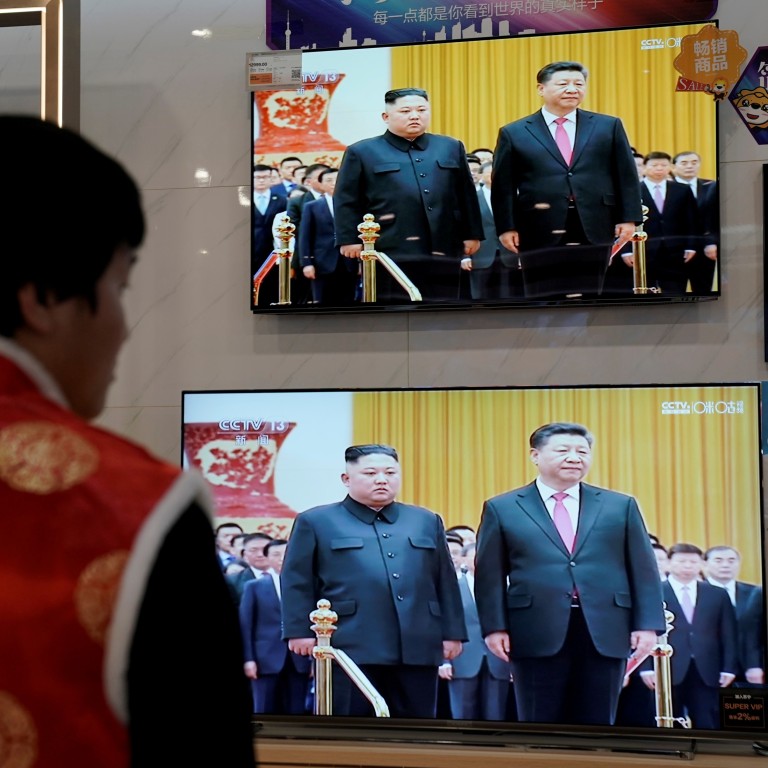
What’s on Chinese President Xi Jinping’s agenda for first official visit to North Korea?
- First trip to North Korea by a Chinese president in more than a decade begins on Thursday
- Restoration of economic relations likely to be on the list
Chinese President Xi Jinping’s maiden state visit to Pyongyang this week may signal an economic re-engagement with the isolated neighbour, according to Chinese state media.
Ahead of the visit, Communist Party mouthpiece People’s Daily suggested, via its social media account, that restoring bilateral economic relations would be on the agenda.
“Bilateral economic and trade issues will be highlighted,” Zheng Jiyong, director of the Korean Studies Centre at Fudan University in Shanghai, was quoted as saying, noting the two leaders would discuss specific ways to adapt to “the new situation and the times”.
“They will also talk about bilateral humanities exchange issues, such as education and teaching cooperation … and cooperation in the field of cultural tourism,” he added.
Xi Jinping to make first official trip to North Korea this week
Zheng said North Korea had taken steps to reform its economy, and introduced China’s industrial manufacturing blueprint to produce its own goods.
Xi will make a two-day official visit to North Korea from Thursday – the first by a Chinese president in more than a decade – just days ahead of his expected trade war showdown with US President Donald Trump at the G20 summit in Osaka.
Kim’s second summit with Trump in Hanoi in February collapsed against a backdrop of continued economic struggle for North Korea. Beijing is wary of instability around the North Korean regime threatening the security of China’s northeast, fearing an influx of refugees into one of its poorest regions.
China vowed last July to enforce sanctions after a United Nations committee accused it and South Korea of being reluctant to enforce a ban on coal exports from the North, although the US has voiced scepticism about Chinese compliance with the sanctions.
During a recent meeting in Singapore, acting Pentagon chief Patrick Shanahan presented his Chinese counterpart Wei Fenghe with pictures and satellite images of North Korean ships transferring oil near the Chinese coast.
US ‘gift’ to China carries pointed message from the Pentagon
People-to-people exchanges – which include tourism – are exempted from the UN sanctions and are North Korea’s only cash cow under the international sanctions regime, making it a legitimate area in which Beijing can promote stability in the neighbouring country.
North Korean leader Kim Jong-un has repeatedly emphasised the development of various “tourist zones” in his plans to rebuild North Korea, with the Samjiyon and Wonsan-Kalma areas prioritised for investment.
Boo Seung-chan, an adjunct professor at the Yonsei Institute for North Korean Studies in Seoul, said tourism was the only sector left for North Korea to earn foreign revenue, and China could use it to help the country.
Indeed, China hinted in April of its willingness to boost human exchanges between the two countries, with the opening of a border checkpoint and bridge connecting the Chinese city of Jian with North Korea’s Manpo border bridge, after a three-year delay.
Bridge linking North Korea to China opens 3 years late – but why now?
The opening of the checkpoint represented a potential boost to the North’s economy as part of Beijing’s effort to balance its concerns about its neighbour against ongoing international pressure for the denuclearisation of the Korean peninsula.
Humanitarian aid is also expected to be supplied to North Korea after Xi’s visit, according to South Korean diplomatic sources.
“Without exception, weeks after [previous] bilateral summits between China and North Korea, China’s presents, including a range of economic aid, went into North Korea via train,” a diplomatic source in Seoul told the South China Morning Post earlier.

